0 Volumes
No volumes are associated with this topic
Subcultures (2)
New topic 2013-06-21 19:46:36 description
The Meaning of Freedom
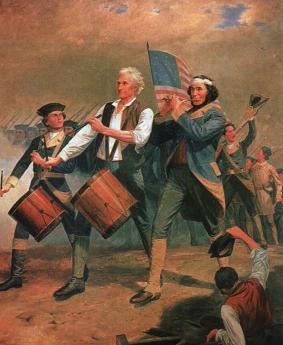
|
During the last campaign, when I was a candidate making an appearance at every meeting of any sort in my district, I frequently asked myself what Tea Party speakers were driving at when they spoke of "freedom". As I gazed over the crowd, I had trouble making out any ignorant red-necks, as President Obama was urging his followers to see as the enemy. They were mostly small business people, and they were at least as well educated as their opponents. I've heard Democratic partisans denounce the Tea Party as being so poorly educated they didn't even believe in Evolution. But I didn't hear a word about that, either.
As these things were going through my head, my eyes swept over the room, trying to make out what the common characteristics might be. True, there were scarcely any people who looked as though they had gone to Ivy League universities, but that is true of almost all crowds you mix with, and anyway I would say most Ivy Leaguers avoid anything having to do with politics, of any variety, on either side. But there definitely was something characteristic about Libertarian crowds. Small businessmen and women were there in abundance. Housewives and farmers were numerous. Older, more conservative people. But all of them dressed alike, which is something I attribute to everybody's clothes coming from China, no matter what their station in life. When you are in Europe, the nationalities seem to blend together for much the same reason.
And then it occurred to me. Almost all of these people worked for themselves, to some degree, or at least all of them had enough freedom to come to meetings when they please, wherever they please. Trying this idea out on some passing strangers, it seemed to resonate. One man, in particular, was vehement about not being able to stand an employment situation in an office, on a schedule, with a boss. When you talk to doctors, they generally express a wish to be solo practitioners or members of a small on-call group. That is true even if they work for a hospital or a group practice; the freedom to be an independent actor was why they went into Medicine, or Law, or started their own business. Most of them acknowledged they made less money that way, but they were willing to do so, in order to be "free". Lots of them are employed people, but that's the one feature they dislike about it.
In Democratic groups, however, many of them work for the government -- the ultimate indignity. And those who don't are happy to commute with regular hours, endure the eight hours cooped together, get home in time to release the baby sitter. But even these people prize the weekend highly. To them, it's the time they are really alive and enjoying what America is all about, wouldn't think of using that precious time at a political meeting.
So one group thinks of the weekend as their time of freedom, while the other group wants to have all of its time left to its own decision. The two groups aren't all that different, except the Libertarians act out their principles, acknowledge a somewhat lower income as an acceptable price to pay for it, and glory in the company of other like-minded Freedom fighters. There's surely more to the political differences than this, but Freedom from having a boss is definitely a big part of it.
Running for the Assembly, Only in Philadelpia
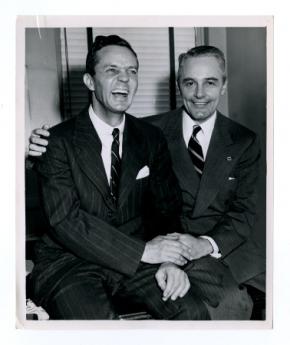
|
| Joseph Clark and Richardson Dilworth |
When I had to confess my defeat (by 5%) at a local club in Philadelphia that I belong to, I had to tell the group why I had been running for the Assembly. Finally, one friend with a puzzled look asked, "I never heard of running for election to the Assembly. I always thought membership was inherited."
Another friend had to tell him that it wasn't that Assembly, with dancing and all, it was the political one in New Jersey.
Only in Philadelphia, could you imagine such a conversation.
William James and the Progressive Movement
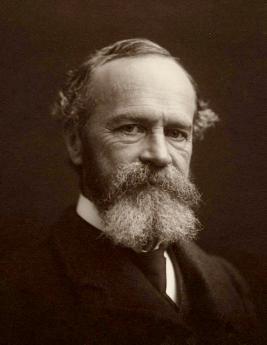
|
| William James |
Howard Callaway, noted historian, recently held forth at a meeting of the Franklin Inn Club about the Progressive Movement of the early 20th Century. His interesting point was that perhaps William James really started it all. The James brothers, William and Henry, were very rich and spent nearly twenty years in Europe. Their ideas may not have originated in Europe, but they certainly had a European tinge to them. Perhaps it is fair to surmise that the Progressives grew out of reaction to the Gilded Age, around 1870, which Howard feels was the last great episode of globalization before the present one.
In spite of the very European origins of Queen Victoria and her family, the British aristocracy has always feared and distrusted Europe. When Britain discovered it couldn't conquer Europe (or America), it turned its attention to developing a great commercial empire by colonizing Africa and East Asia. That led to building a Navy and establishing naval refueling stations at strategic places around the globe. Meanwhile, the Spanish empire was deteriorating, and colonization took on the form of competition between England, France, and Germany for the remnants of the Spanish empire. For background music, the Dreyfus episode led to or was prompted to lead to, an anti-military attitude that had considerable world-wide effect, essentially none of the above. In time, the none of above military attitude fused with Progressivism of the environmental sort which viewed industrialization as the enemy.
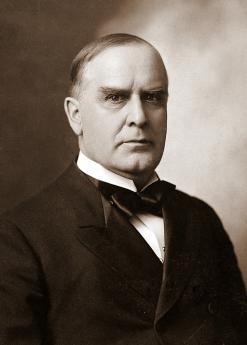
|
| William McKinley |
In a sense, American attitudes were influenced by William McKinley, who managed to convince labor they would be better off by advancing the cause of their bosses. Part of the reaction to this was the Populism of William Jennings Bryan and Robert LaFollette. McKinley's assassination and the promotion of Teddy Roosevelt was an unexpected turning point in American politics. Meanwhile, Admiral Dewey's fleet was stationed in Hong Kong. This association between America and Great Britain, along with secret German attempts to intervene in unobtrusive ways during the Spanish-American War were important factors in the later alliance between Britain and America in World War I. The burgeoning alliance between labor and management which McKinley was well along toward making the dominant force in American politics, was thus precipitously switched toward Progressivism by McKinley's assassination, which revealed he had made the one major blunder of selecting Teddy Roosevelt as his vice president, who in turn made the same blunder in reverse by selecting William Howard Taft as his own successor. The splitting of the Republican party between Roosevelt and Taft made possible the election of Woodrow Wilson, the college professor.
It thus can be concluded that the repeated switching between Conservatism and Progressivism during the Presidencies of McKinley through Wilson was the main source of the present rearranged coalitions we call the Republican and Democratic parties. It only remained for Franklin Roosevelt to complete the process by fitting the South, Catholics, and Jews into the Democratic Alliance, and Richard Nixon to undo it partially with switching the South and the Catholics back into the Republican party. The demography of the parties has changed more than the ideology, which tends more toward a coalition of business and Southerners versus blue-stocking progressives linked with labor union populists. Underlying all of this is the general acknowledgment of the need for a two-party system. Instead of having five or six small parties, the ultimate choice is whether a dissatisfied sub party is disaffected enough to switch parties. The nation is geographically so large and the subgroups so scattered that almost everyone except recent immigrants instinctively respects the two-party imperative.
Enforcing the Constitution: Civil Monetary Penalties (CMP)
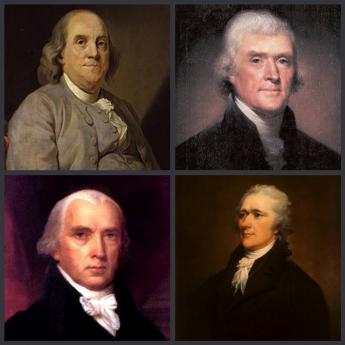
|
| Founding Fathers |
The 1787 Constitution created three branches of government along with their defined powers but described no remedy for a branch overstepping its boundaries. Gradually, a system evolved for declaring some laws unconstitutional, one by one, clarifying individual issues along the way. By contrast, the founding fathers viewed the President as an agent of Congress, expecting Congress to devise controls if needed. George Washington had an intense distaste for monarchs, and eight years as Commander in Chief had exposed no taste for conflict with the Continental Congress. Unfortunately, this has proven to be unusual for Presidents, especially as popular sovereignty appears to expand the Presidential mandate. Moreover, Washington himself developed more friction with Congress during his two terms as President.
In retrospect, the main factor behind Presidential restlessness is the experience of misinterpreting the meaning of a broader electoral mandate, which can more properly be traced to hasty repair of the defects of the 1800 election process. Experience has shown that while ignoring rules invites anarchy, the impeachment of a President usually seems too drastic a remedy for unwelcome innovation while impeaching the whole Legislative Branch for failure to supervise in a general way, is incomprehensible. The President needs some sort of supervision. While the original intent was to have Congress do the supervising, the Supreme Court is now probably better suited for judging the issue of unconstitutional behavior, except for the awkwardness that the President appoints the Supreme Court. These are the simple ingredients of a solution, preferably unwritten and revolving around conferring special "standing" in special circumstances.
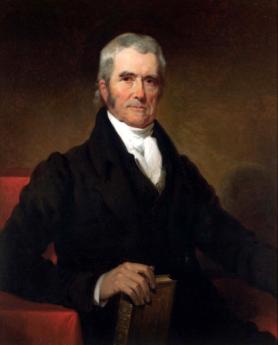
|
| Chief Justice, John Marshall |
At present, grievances tend to accumulate until someone acquires "standing" by being injured. At present it is generally true a grievance scarcely matters if no one is injured, but the exception is the lack of redress for injury to the Constitution, whereby everyone may be injured. Furthermore, actual experience with creeping boundary encroachment has mostly proved to be nuanced, rather than confrontational, gradual rather than abrupt. The descriptive example is that of a frog in a gradually heated pan of water, whereby the frog is cooked faster than he realizes he is in danger. Otherwise, the courts have evolved an unspecified balance which has proved remarkably serviceable.
It took thirty years for John MarshalI to formulate the general approach needed. In Marbury v. Madison , his first action after becoming Chief Justice, John Marshall suggested a writ of Mandamus (i.e. "We command...") from the Court might well be the first step in what he coyly described as only a hypothetical situation. Only lawyers were expected to recognize fully that If the President ignored the writ, then the grounds for impeachment might escalate, with the President forced into the role of flouting a decision of the Court. Regardless of how it stood on the original issue, the public would likely support a Court in performing its duty to make difficult decisions.
One way or another, the national issue would become one of whether the nation wished to continue with its Constitution; Marshall had only outlined the steps the process would probably take. At several points along the way, the Chief Justice would have a chance to back off. But Marshall's lifelong hatred of his cousin Thomas Jefferson was so well known there was little doubt he was serious. Knowing of his cousin's hatred for him, President Jefferson let the matter drop; subsequent Presidents followed his example. Generations of lawyers have studied this case and pondered its implications. The solution to the problem of extending it from unconstitutional laws to unconstitutional behavior, probably already exists in many minds.
Casino Warfare
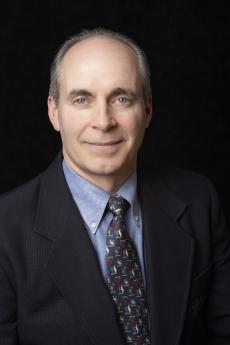
|
| Stephen P. Mullin |
Stephen P. Mullin came by the Right Angle Club and told us what happened in the casino world, in about five sentences. As anyone who reads the papers will know, four brand-new, billion-dollar, casinos are going broke in Atlantic City. What most of us didn't know was that gambling revenues are going up, nationally, and more people are visiting casinos than ever before. That doesn't sound right.
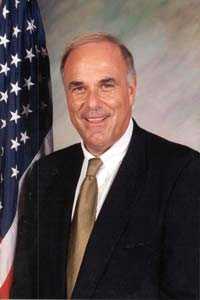
|
| Ed Rendell |
All it takes to understand this paradox is to look at a map of casinos in the region, with a focus on the Philadelphia/New Jersey region. A few years ago, Las Vegas and Atlantic City pretty much had a monopoly on casinos in America, and then the Indians found they, too, had a special political exemption. And then Pennsylvania's ebullient governor, Ed Rendell noticed that most of the license plates were Pennsylvania plates, going over the various bridges to New Jersey. So he hired Steve to be a consultant, and sure enough, an awful lot of money made in Atlantic City was Philadelphia money. The Legislature was strong-armed into permitting slot machines in Pennsylvania, the necessary building permits were issued, and Pennsylvania started taking back its own gambling money. The New Jersey casinos promptly lost business, and the over-supply of them dragged the financially weakest of them, down the tube. Mystery solved, and that's about all there is to the story.
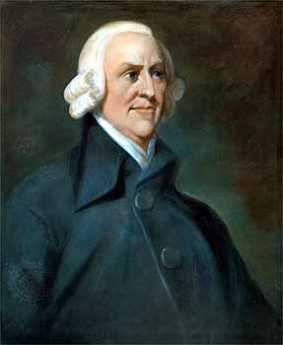
|
| Adam Smith |
Adam Smith once wrote that "The more you gamble, the more certain you are to lose." The gamblers lose money, and the neighborhoods turn sour, but this was the first I had heard that the owners of the casinos could lose money, too. And now, come to think of it, the politicians can lose money, as well. Not at first, perhaps, because a lot of gamblers want to try out the newest and latest slot machines, as well as look down on themselves through looking up, at the new mirrors on the bedroom ceilings. Speaking of that, Steve tells us that the big money is made on slot machines. The so-called table games lose money and are just for show. Which reminds me that I once ran into the man who invented the modern slot machine. He was a surgeon from the West Coast, but one of his patients complained that people were robbing the old-fashioned slots by drilling holes in the side when no one was looking. One of their buddies would come back later, and stick a metal wire in the hole, triggering a noisy jack-pot. My new friend the surgeon was a computer nut and substituted little computers for the clunky mechanicals. That frustrated the pilferers, but it also drove away from the ordinary folks who put in silver dollars instead of wires. They liked the clunking noises and flashing lights, so fake rattles, and flashing lights were installed, making everybody happy again. He was tired of taking out gall bladders, anyway, so he retired to cruise ships where he could spend his time entertaining passing doctors. He was advised that was a good thing to do, anyway, in order to keep himself healthy. People who owned a lot of old clunky mechanical ones are apt to be vengeful types, you see.
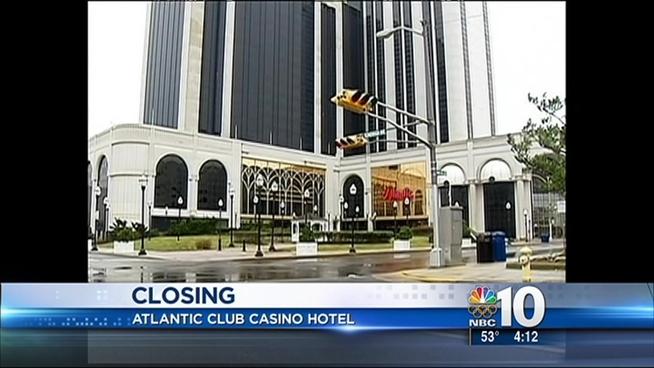
|
| Casino's Closing |
Well, the politicians who get bribed to permit casino licenses are delighted to tell you how much out-of-state money these benevolent institutions bring into the state, $1.4 billion dollars a year in the case of Pennsylvania. So they get re-elected to office in those hide-away little rural villages which characterize America's state capitals, where a number of them have just had brass plaques attached to their portraits, at least in Harrisburg, to commemorate this or that majority leader who afterward went to jail. As one of them just told the news media, "You can't change history, can you?" The City of Harrisburg just went bankrupt over some sewage disposal plant, and you may remember that Philadelphia was once the state Capital. The fact that 49 of the fifty state capitals are in small towns, without much in the way of investigative journalism, and the additional fact that most capitals have been moved from corrupt old cities to the regions inhabited by the noble savages, gives you a sign that this wasn't exactly an accident. The state government is clearly the weakest part of our political system, and its operation in the dark corners of states is more cause that symptom. Someday I'll tell you the story of a multi-billionaire who asked me to suggest a good place to donate some money. I suggested that funding several think tanks in state capitals might produce a significant improvement in the environment, and he thanked me for the advice. Unfortunately, he bought the Chicago Cubs instead, so the experiment never got tried out. There's no doubt that Chicago could use a little reform movement, too, judging by some of the political specimens that have recently crawled out from under that rock. While Philadelphia is neither as corrupt nor as contented, as it was a century ago. We get our fun bankrupting casinos in other cities.
Just one more story. Some New York potentates once took it in their heads to buy up some Health Maintenance Organizations (HMO). Somehow my name was referred to them, and I was hired as a consultant, to put on a white coat and walk around inspecting AC's local HMO. Naturally, I was driven down one of many new highways which New Jersey had built to attract the gambling trade, although I could have gone down on one of the newly refurbished train systems with the same purpose. Inside the HMO, I must say I have never seen so much syphilis, cirrhosis, schizophrenia, and associated medical features of the gay life, and I hope never to see that sort of medical excitement again. Those were the employees of the casinos, the so-called permanent members of the community. New Jersey may have enjoyed a brief spell of prosperity with out-of-state money. But if you balance that against the present rubbish heap, I'm not at all sure the taxpayers of New Jersey were financially better off for the experiment, on long-term balance.
Bring Your Own Hammer
Stonehenge in England is a ring of big stones standing on the edge, but only recently has it been discovered that they chime when you hit them with a hammer. The British didn't discover the phenomenon, however. Long ago the Quakers of Pennsylvania knew they had ringing rocks in a moraine dumped at the edge of a receded glacier in Bucks County. The County has made it a recreation park which is mostly deserted, except when a drove of cars appears, bearing dozens of Cub Scouts or other excursionists.
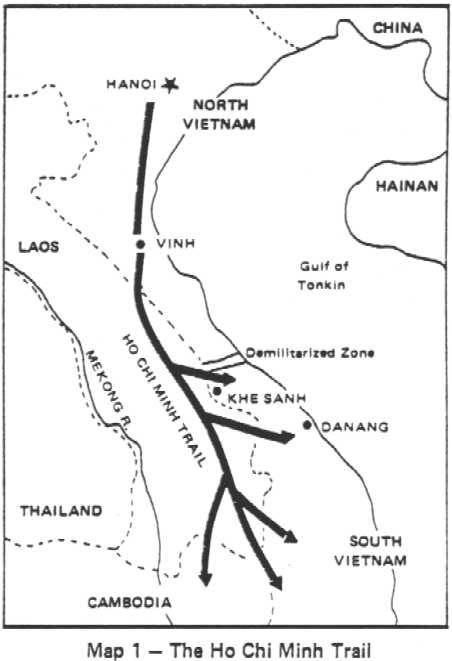
|
| Ho Chi Minh Trail |
Just what makes these boulders chime when you hit them with a hammer, isn't entirely clear. It's certainly a good topic for a geologist to use for a thesis, but right now none of the visitors to the park cares very much. It can easily be seen that the moraine marks the edge of the fertile plain surrounding Philadelphia, to the north of which the ground breaks up and has mining as its main industry. The farms suddenly become smaller and less prosperous on the moraine plateau, and fancy exurban restaurants yield place to auto dumps and parks of pickup trucks. In certain seasons, it is possible to imagine the gun racks above the front seats. Some of the areas suit itself for summer cottages in the hot weather, usually close to a stream or lake. This is the area where the Shenandoah Valley extended, narrowing down to the Delaware Water Gap. George Washington didn't just cross Delaware once near here, it was a sort of a Ho Chi Minh Trail out of reach of the British Fleet during the Revolutionary War. The main arsenal of the Revolution was in Reading. The valley meets what used to be an industrial area along Delaware, coming up from Philadelphia. Before that, the Seneca Indians had made it their headquarters, and after that, people like Stephen Girard discovered and exploited the minerals once exposed by the glaciers to the north. There's a "wind gap" (cleft in the mountain without water at the relatively high base), and the water gap. William Penn terminated his line separating East from West Jersey at Dingman's Ferry within this region, and later his sons' agents cheated the Indians with the Walking Purchase nearby. The politics of Bucks County are easily imagined by looking at prosperous Doylestown and comparing it with nearby rundown Easton. This is really just the center of Bucks County, half of which extends to the North, and all of which must have an interesting political history.

|
| Ringing Rocks County Park |
Abruptly, turning a corner amidst the summer cottages, is a neat little park, the Ringing Rocks County Park. At times it is deserted, at other times you can hardly find a place to park your car. Fields of boulders, three to ten feet in diameter, extend down the hill to the river. It's easy to go down, not so easy to get back up to your car. People pile out of their cars, carrying brand-new hammers, and you can see dozens of (probably disappointed) pockmarks on the rocks near the parking area. If you thought it was going to be easy, you are quickly disappointed.

|
| Japanese Beetle |
But the legions of cub scouts, happily swinging their hammers, swarm down on the rock piles, hitting every rock as they go. If there are enough of them, you hear plenty of clunks, but also an occasional ringing chime is heard, and the other cubs soon swarm around. At a rather daunting distance from the edge of the rock field, one cub scout after another discovers a rock that chimes like a cowbell. He attracts his friends, who have a whack at it. The chimes never quite outnumber the clunks, but the music rises as the scouts swarm over the property on agile little feet that soon defeat their elders' lumbering climb. A sudden thundershower made the rocks too slippery even for kids, and the place quickly emptied out. When we got back to the top of the hill, soaking wet, there were only a few cars still there.
Millennials: The New Romantics?
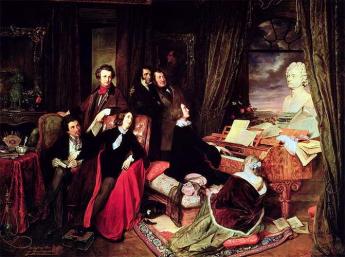
|
| Romantic Era |
It was taught to me as a compliant teenager that the Enlightenment period (Ben Franklin, Voltaire, etc.) was followed by the Romantic period of, say, Shelley and Byron. Somehow, the idea was also conveyed that Romantic was better. Curiously, it took a luxury cruise on the Mediterranean to make me question the whole thing.
It has become the custom for college alumni groups to organize vacation tours of various sorts, with a professor from Old Siwash as the entertainment. In time, two or three colleges got together to share expenses and fill up vacancies, and the joint entertainment was enhanced with the concept of "Our professor is a better lecturer than your professor", which is a light-hearted variation of gladiator duels, analogous to putting two lions in a den of Daniels. In the case I am describing, the Harvard professor was talking about the Romantic era as we sailed past the trysting grounds of Chopin and George Sand. Accompanied by unlimited free cocktails, the scene seemed very pleasant, indeed.

|
| Daniel Defoe |
In the seventy years since I last attended a lecture on such a serious subject, it appears the driving force behind Romanticism is no longer Rousseau, but Daniel Defoe. Robinson Crusoe on the desert island is the role model. Unfortunately for the argument, a quick look at Google assures me Defoe lived from 1660 to 1730, was a spy among other things, and wrote the book which was to help define the modern novel, for religious reasons. His personal history is not terribly attractive, involving debt and questionable business practices, and his prolific writings were sometimes on both sides of an issue. He is said to have died while hiding from creditors. Although his real-life model Alexander Selkirk only spent four years on the island, Defoe has Crusoe totally alone on the island for more than twenty years before the fateful day when he discovers Friday's footprint in the sand.
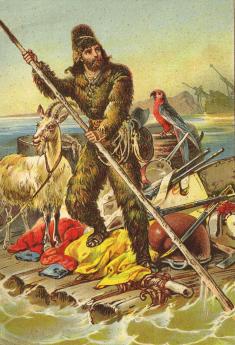
|
| Robinson Crusoe |
But the main point of history was that Defoe was born well before William Penn and died before George Washington was born. The romanticism he did much to promote was created at least as early as the beginning of the Enlightenment and certainly could not have been a retrospective reaction to it. Making allowance for the slow communication of that time, it seems much more plausible to say the Enlightenment and the Romantic Periods were simultaneous reactions to the same scientific upheavals of the time. Some people like Franklin embraced the discoveries of science, and other people were baffled to find their belief systems challenged by science. While some romantics like Campbell's Gertrude of Pennsylvania, who is depicted as lying on the ocean beaches of Pennsylvania watching the flamingos fly overhead, were merely ignorant, the majority seemed to react to the scientific revolution as too baffling to argue with. Their reasoning behind clinging to challenged premises was of the nature of claiming unsullied purity. Avoidance of the incomprehensible reasonings of science leads to the "noble savage" idea, where the untutored innocent, young and unlearned, is justified to contest the credentialed scientist as an equal.
Does that sound like a millennial to anyone else?
"Sir"
In 1938 when I was 14 years old, I entered a new virtual country with its own virtual language. That is, I went to an all-male boarding school during the deepest part of the worst depression the country ever had.

|
| Boarding School |
identified While it should be noted I had a scholarship, there is little doubt I was anxious to learn and emulate the customs of the world I had entered. My life-long characteristic of rebellion was born here, but at first, it evoked a futile attempt to imitate. Not to challenge, but to adopt what I could afford to adopt. The afford part was a real one because the advance instructions for new boys announced a jacket and tie were required at all meals and classes, and a dark blue suit with a white shirt for Sunday chapel. That's exactly what I arrived with, and let me tell you my green suit and brown tie were pretty well worn out by the first Christmas when I came home on the train for ten days vacation, the first opportunity to demand new clothes. First-year students were identified by requiring a black cap outdoors, and never, ever, walking on the grass. The penalty for not obeying the "rhine" rules was to carry a brick around, and if discovered without a brick, to carry two bricks. But that's not what I am centered on, right now. The thing which really bothered me was unwritten, equally peer-pressured by my fellow students, the custom of addressing all my teachers as Sir. The other rules only applied until the first Christmas vacation, but the unwritten Sir rule proved to be life-long.
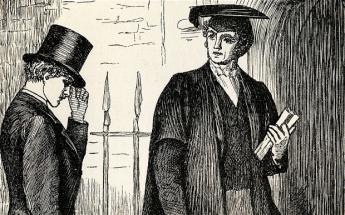
|
| Sir |
And it was complicated. It was Sir, as an introduction to a question, not SIR!, as a sign of disagreement. You were to use this as an introduction to a request for teaching, not as any sort of rebuke or resistance. Present-day students will be interested to know that every one of my teachers was a man; my recollection is, except for the Headmaster's secretary, the Nurse was the only other female employee. The average class size was seven. Seven boys and a master. Each session of classes was preceded by an hour of homework, the assignment for which was posted outside a classroom containing a large oval maple table. Needless to say, the masters all wore a jacket and tie, most of the finest style and workmanship. They always knew your name, and always called on every student for answers, every day. Masters relaxed a little bit during the two daily hours of required exercise, when they took off their ties and became the coaches, but were just as formal the following day in class. I had been at the head of the class of what Time Magazine called the finest public high school in America, but I nearly flunked out of the first semester in this boarding school. It was much tougher at this private school than I felt any school had a right to be, but they really meant it. Over and over, the Headmaster in the pulpit intoned, "Of those to whom much is given, much is expected."
I had some new-boy fumbles. Arriving a day early, I found myself with only a giant and a dwarf for a company at the dining table. I assumed the giant was a teacher, but he was a star on the varsity football team. And I assumed the dwarf was a student, but he was assistant housemaster. One was to become a buddy, the other a disciplinarian, but I had them reversed, calling the student "Sir", but the master by his first name. Bad mistake, which I have been reminded of, at numerous reunions since then.

|
| Yale |
When I later got to Yale, I began to see the rules behind the "Sir," rule. In the first place, all of the boarding school graduates used it, and none of the public school graduates, although many of the public school alumni began, falteringly, to imitate it. Without realizing it, a three-year habit had turned out to be a way of announcing a boarding school education. The effect on the professors was interesting; they rather liked it, so it was reinforced. It had another significance, that the graduates who said "Sir" acquired upper-class practices, the red-brick fellows seldom did. The only time I can remember it's being scorned was eight years later, by a Viennese medical professor with a thick accent, and he was obviously puzzled by the significance. Hereditary aristocracy, perhaps. Indeed, I remember clearly the first time I was addressed as Sir. I was an unpaid hospital intern, but the medical students of one of the hospital's two medical schools flattered me with the term. In retrospect, I can see it was a way of announcing that graduates of their medical school knew what it meant, while the other medical school was just red-brick. Although the latter had mostly graduated from red-brick colleges, their medical school aspired to be Ivy League.
If you traveled in Ivy League circles, the Sir convention was pretty universal until 1965, when going to school tieless reached almost all college faculties, thus extending permission to students to imitate them. Perhaps this had to do with co-education, since the sir tradition was never very strong in women's colleges, and denounced by the girls when the men's colleges went co-ed. Perhaps it had to do with the SAT test replacing school background as the major selection factor for admission. Perhaps it was the influx of central European students, children of European graduates for whom an anti-aristocratic posture was traditional, and until they came to America, largely futile. Perhaps it was economic. The American balance of trade had been positive for many decades before 1965; afterward, the balance of trade has been steadily negative.
In Shakespeare's day, "Sirrah" was a slur about persons of inferior status. In Boswell's eighteenth Century day, his Life of Johnson immortalized his characteristic put-down with a one-liner. It survives today as a virtually text-book description of how to dominate an argument at a boardroom dispute. "Why, Sir," was and remains a signal that you, you ninny, are about to be defeated with a quip. It's a curious revival of a new way of immortalizing small-group domination, and a very effective one at that, which even the soft-spoken Quakers use effectively. Whatever, whatever.
The 90-plus years of tradition of addressing your professor as "Sir," is gone, probably for good, except among those for whom it is a deeply ingrained habit. Along with the tradition of female high school teachers, followed I suppose by male college professors.
8 Blogs
The Meaning of Freedom
 To a considerable extent, Libertarians and Tea Partiers are speaking of freedom from an employer when they celebrate American freedom.
To a considerable extent, Libertarians and Tea Partiers are speaking of freedom from an employer when they celebrate American freedom.
Running for the Assembly, Only in Philadelpia
 Except for Clarke and Dillworth, Philadelphia social leaders haven't had much to do with politics for a century.
Except for Clarke and Dillworth, Philadelphia social leaders haven't had much to do with politics for a century.
William James and the Progressive Movement
 Did William James start the Progressive Movement?
Did William James start the Progressive Movement?
Enforcing the Constitution: Civil Monetary Penalties (CMP)
 The Constitution does not define penalties if one branch of government oversteps its grant of authority. But starting with writs of mandamus , the U.S. Supreme Court has left the other two branches with little alternative but compliance.
The Constitution does not define penalties if one branch of government oversteps its grant of authority. But starting with writs of mandamus , the U.S. Supreme Court has left the other two branches with little alternative but compliance.
Casino Warfare
 Casino revenues and visitors are prospering all across the country. But four brand-new casinos are going bankrupt in Atlantic City. Ask Eddie Rendell what happened.
Casino revenues and visitors are prospering all across the country. But four brand-new casinos are going bankrupt in Atlantic City. Ask Eddie Rendell what happened.
Bring Your Own Hammer
 Pennsylvania has 120 State Parks, but this is a Bucks County Park. The exposed bedrock is in an eight-acre park of great big boulders, a few of which chime when you strike them. The rest just give out a clunking noise.
Pennsylvania has 120 State Parks, but this is a Bucks County Park. The exposed bedrock is in an eight-acre park of great big boulders, a few of which chime when you strike them. The rest just give out a clunking noise.
Millennials: The New Romantics?
 The romantic period of literature is said to have followed the Enlightenment. Maybe they were just different people at the same time.
The romantic period of literature is said to have followed the Enlightenment. Maybe they were just different people at the same time.